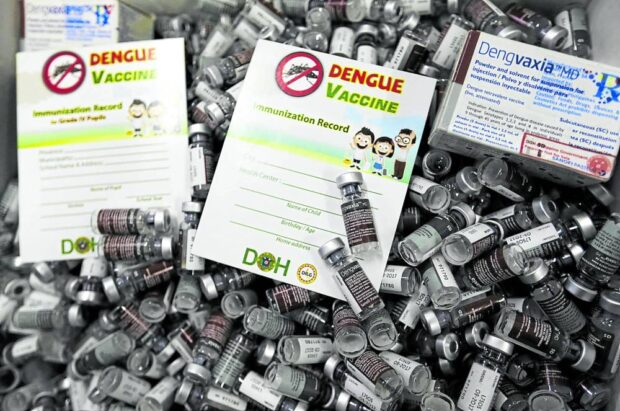
File photo, taken in 2017, shows empty vials of Dengvaxia used in a school in Sta. Cruz, Manila. —INQUIRER PHOTO
There are already three applications for the commercial use and sale in the Philippines of new dengue vaccines, but the Food and Drug Administration (FDA) said Sanofi Pasteur’s controversial Dengvaxia was not among them.
The FDA did not explain why it could not identify the three brands, but it was apparently linked to the vaccine safety controversy that arose after the deaths of at least 60 schoolchildren were linked to the Dengvaxia shots they received in 2016.
The FDA made the announcement after Japanese drug maker Takeda Pharmaceutical said on Tuesday it was withdrawing its US application for its dengue vaccine, branded as Qdenga.
Qdenga has already been authorized for those aged 4 and older in the European Union, United Kingdom, Brazil, Argentina, Indonesia and Thailand, US news service Reuters quoted the company as saying.
Japan-based Takeda cited data collection issues with the US health regulator, which cannot be addressed within the current review cycle.
Sanofi’s Dengvaxia, the world’s first dengue vaccine, was licensed in 2015 and was used in a P6.6-billon school inoculation program in 2016.
But the French drugmaker reported in 2017 that Dengvaxia was found to increase the risk of severe disease in “seronegative” children, or those who had no prior dengue exposure when they got the shot.
In the Philippines, the FDA revoked Dengvaxia’s registration after the controversy that caused vaccine hesitancy and misinformation among parents.
It later emerged that a scientist at the Research Institute of Tropical Medicine who recommended Dengvaxia was previously involved in a study funded by Sanofi.
Preventing Dengue infections
Despite no locally available dengue vaccines, however, various groups of doctors have called for the revival of the program amid a continued spike in infections and a high mortality rate of the mosquito-borne illness in the country.
Dr. Rontgene Solante, president of the Philippine College of Physicians, on Wednesday said “we cannot control an infection without vaccines.”
“It’s important that vaccines should be part of that priority for our government in terms of controlling dengue, aside from other measures, like vector control, diagnosis and clinical management,” he said at a press conference.
According to Dr. Florentina Ty, president of the Philippine Pediatric Society, vaccination is a key component in preventing infections, especially deaths, which is her group’s main priority in the next few years.
“We cannot allow a child to die of dengue. And this is what PPS is really working on… to have zero mortality by 2030,” she said.
Ty expressed frustration over how dengue has remained a public health concern in the Philippines in the last 70 years, despite collective efforts to eradicate the viral infection.
In July last year, then officer in charge Maria Rosario Vergeire said the Department of Health has started reviewing different dengue vaccines under the “emergency medicines list” of World Health Organization.